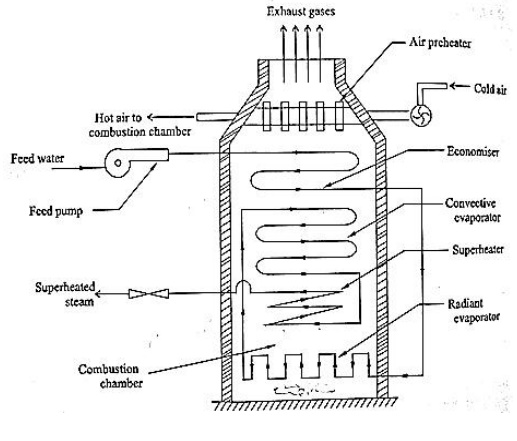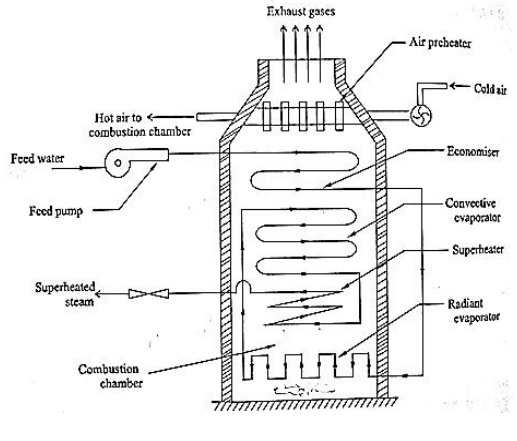Chapter: Mechanical and Electrical : Power Plant Engineering : Power Plants and Boilers
Benson Boiler (Supercritical Boiler)

BENSON BOILER (SUPERCRITICAL
BOILER)
The main difficulty experienced in the La Mont boiler is the
formation and attachment of bubbles on the inner surfaces of the heating tubes.
The attached bubbles reduce the heat flow and steam generation as it offers
higher thermal resistance compared to water film. Benson of siemens- West
Germany in 1922 argued that if the boiler pressure was raised to critical
pressure (225 atm.), the steam and water would have the same density and
therefore the danger of bubble formation can be completely removed.

Important Components
1. Economiser – The feed water from the well passes
through the economiser where it is pre-heated by the pre-heat of exhaust
hot flue gases.
2. Radiant evaporator – The feed water after circulation
through the economiser flows through the radiant evaporator tubes. Water
is heated up by the radiation heat from the combustion chamber. Here, part of
the water is converted to steam directly.
3. Convective evaporator – The mixture of water and steam
coming out from the radiant evaporator enters the convective evaporator
tubes. The hot flue gases passing over the evaporator tubes transfer a large
portion of heat to the water by convection. Thus, water becomes steam in the
convective evaporator.
4. Superheater – The steam from the convective
evaporator enters the superheater tubes where it is superheated by the
hot flue gases passing over them. The superheated steam then enters the steam
turbine to develop power.
5. Air pre-heater – The hot flue gases then passes
through the air pre-heater where the
air required for combustion is pre-heated.
Advantages
1. As there is no drum, the total weight of Benson boiler is 20%
less than other boilers. This reduces the cost of the boiler.
2. Floor space requirements of Benson boiler are very less.
3. Transportation of Benson boiler parts and its erection is very
easy as there are no drums.
4. Natural circulation boilers require expansion joints in pipes
but the pipes in Benson boilers are welded.
Disadvantages
1. As the Benson boiler operates at high pressure and temperature,
special alloy materials are required.
2. Maintenance costs are very high.
3. This is more efficient, resulting in slightly less fuel use.
Related Topics